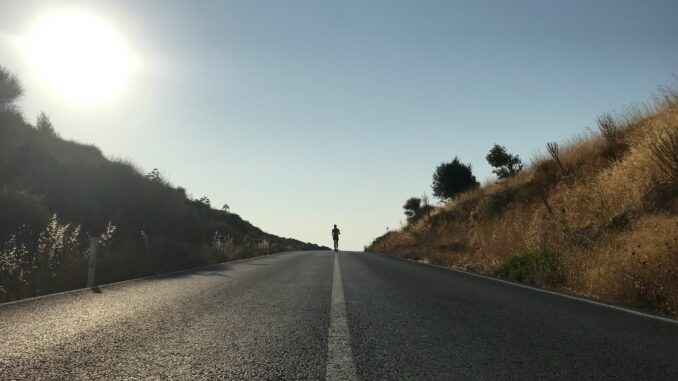
Today marks the publication of the first of our top five stories in the 10th annual Voorheesville Short Story Contest, Lindsey Wight’s “Twenty Six Point Two.” The theme of this year’s contest was “But, There’s a Catch,” and Lindsey’s story of running and the impact it has connected with the theme nicely. Our judge, Laurin Jefferson, praised Lindsey for her technical experimentation and encouraged her to keep on experimenting. We hope you enjoy it!
The sun was rising over an endless strip of road. They found themselves squinting at the horizon. Partners with signs, cheering parents, and smiling friends were lining the sidewalks as the runners charged through the start line. They knew their own friends and partner were among them, but did not expend the energy to look. Every ounce was put into their seemingly effortless stride. They cycled through the motion as a sea does the tide, their legs falling and rising as though their body was made of air.
As the first mile came to a close, they began to weave through those already tired, those who unknowingly sprinted through the start. They saw envy in the sprinters’ eyes—a look they were accustomed to from the ones that had chosen to sleep in on a Sunday morning instead of dredging through the wall of winter cold. The ones who chose tomorrow to take on the fatigue of strength training. The sprinters saw their tidal stride and jogged painfully beside it.
The crowd died away. The army of runners had trickled into groups of one, two, or three as the morning light rose through the leaves. They were four feet behind a squat middle-aged woman with a ponytail of braids which collided with a crash as she ran. The whips attached to her head were predictable, striking back and forth as did an old grandfather clock. With each snap, their foot struck the ground. Snap-land, snap-land—they synchronized their footfalls to the whip’s rhythm.
They did not try to pass the woman. Given the hidden muscle that sculpted her legs and her silent, steady breath, her time would be faster than their own. That was fine with them. They were grateful for the snap, for their conductor. As their feet kept in time, their head wandered a different path.
It wound through corridors of darkened willows, leaving long, sharp leaves swaying in its wake. Images appeared as the blades shifted and shimmered. The ancient, uneven twigs held birthdays of years past; elementary school friends that had long since moved away; a puff of wintry breath in a January riddled with frost; the jangling keys of their first apartment.
Within these branches they saw their partner, stunning in a tailored gown, sitting alone at the orchestra. The woman’s hair snapped the baton back and forth, conducting the black and white hoard of musicians. A somber smile spread across their partner’s lips. The symphony continued on even with the booming silence singing from the empty space next to their partner. The space for them.
They had a long run in the morning.
They had a lift that night and a long run in the morning.
Their hands had begun to shake as they dressed for the once-leather seats. They could have gone. They could have taken their partner’s hand and they could have smiled while they felt the rise and fall of the movements and they could have squeezed three times for an ‘I love you’ as the music made them feel more than they knew how to express.
But they had a long run in the morning.
They had a long run in the morning and a lift that night and their mind swarmed with you have to, you have to.
You have to.
They went to bed after their lift promptly at 9 p.m.
Snap-land.
Snap-land.
They latched onto the pulse of their conductor as the sun rose high overhead. The glamor dissolved, reduced to a sheen of sweat that melted down their face. The once free motion of lifting one leg and placing down another was now demanding a cost. Even so, they kept in time with their eyes fixed forward. The conveyor belt they were welded on shifted from gravel to dirt.
The green paint held in the trees smeared, the artist mixing them into a new shade. It was a day where the weather begged one to go outside. The gentle breeze brushing through their hair did nothing to stop the burning heat growing in their stomach. Golden rays of sun gliding through the canopy only caused their eyes to squint. The constant beat of the baton drew fainter and fainter as the muscles in their conductor’s legs pushed her further and further ahead. Wrens sang a melody over its fading rhythm, one that pounded in their ears. The bird’s poo-tee-weet swirled around their brain. Harmonies echoed through the willow trees’ stretched arms. The sweet tune bounced through its branches, transforming bright song into eerie refrain. Louder and louder it became, higher and higher it spiraled mixing and molding and deforming the images of success, of finishing. They needed the snap. They needed clarity. Their mind could not afford to wander.
Yet the mind was not accustomed to listening to the woes of humankind.
The chatter of birds transitioned into the chatter of an evening three months prior. A warm Thursday night had lured six or so friends into their apartment. On the ugly beige walls they had been meaning to paint olive were framed photographs their partner had taken. A single beam of light brought a trail to life, or a glistening waterfall which sparkled under the sun. Their three sets of running shoes were neatly stacked beside their partner’s single pair on a rack under the overflowing coat hangers. Perfectly aligned wedding photos hung between open windows flanked by flowered curtains. The oaken hardwood floors led into the kitchen where laughter trickled as did spilled sugar: sparkling, and vibrant, and sweet. The group ate up each other’s voices as a sailor did a siren’s song. The vibrant tones soared into their ears while their nose was filled with the syrupy perfume of joy.
A sharp noise cut through the aura. Their alarm had gone off at precisely 10 p.m., and with a few short words, they had soured the room’s sugary air. The group’s smiles were brushed aside, as were crumbs from a spotless counter.
They headed up to bed with little resistance from the small crowd huddled around the island—the group had attempted to argue before. It was known there was no changing their mind.
The stairs creaked with disapproval. Each step chastised them for leaving behind the ecstasy of a gathering in full roar. But they had to go. Their alarm had demanded it. They did not glance behind them when closing the bedroom door.
The foam roller was put to use in the soundless room, along with the massage gun, tennis ball, and elastic band. All the while, voices flew gracefully through the air vent. Their legs were the only things admiring their melancholy smile as they reached to touch their toes. They were a stream as they stretched, fluid, and flowing, and malleable. They were unfazed by the soreness it provoked, swaying side to side as the exhaustion from the day fully took form.
With their routine done, they laid in bed to rest, but found themselves unable. Their closed eyes tightened as haunting laughter rose through the vent, honeyed perfume climbing alongside it. The scent infiltrated their nose, curling into their thoughts. It was a toxic gas infecting their mind, a distraction, a sickeningly sweet smell they were unable to resist. Drifting between the world of wakefulness and that of sleep, the voices of those they loved continued to torment, to swirl, to rise, to spiral.
Their eyes were pulled open.
They were breathing with more air than their pace demanded. They could not afford for their mind to be untethered. It needed a rein, structure. Against the screaming choir of better judgment, their legs filled with stone moved faster, closer to certainty. Their mind quieted as the braided hair in front of them began to take shape.
Snap-land.
Snap-land.
They kept their eyes forward.
The miles slowly etched by. A race was a sculpture, a tablet created through each strike of a chisel. Its sharpened tip bore into their legs, shocking the muscles into submission. The artist’s hands behind it distorted their breath with a blow to the trachea. Air traveled with a wheeze, in and out, in and out. With one, two steps in, one out—one, two steps in, one out—their breath labored as much as they did. The air only helped to fuel the fire in their lungs as it spread through their torso. The chisel slammed into their stomach, giving it the confidence to protest against the hours of constant thrashing with a churning of its own. It hammered into their shoulders agonizing their joints, it encased their arms in ice, it placed a deafening pounding into their head.
But each workout had sculpted them before. They had trained for the abrasion.
The 1,609 meters turned to 1,568 to 1,532 to 1,497. The baton continued back and forth, back and forth, complying their mind to remain focused. They could not let it out of sight. They could not let themself be distracted, not when they had given up so much.
They had given up so much, all for these twenty six point two miles. The months, the weeks, the hours and minutes and seconds all focused on twenty six point two miles. And then they saw it.
Not the finish line. Not the finish line adorned with signs and cheers and spectators. Not the finish line they had been dreaming of for the past one hundred and eighty two days.
They saw their partner.
Their partner was worried.
You’ve been spending too much time on this, love. You need a break, to let yourself rest. Why don’t we watch a movie? C’mon, I’ll let you pick. We can even watch that hockey one you’re obsessed with.
1,273
I’m not obsessed, I promise. But I’m sorry, hon, I gotta stretch and then get to bed.
1,141
When’s the last time we’ve just sat and watched something together?
1,035
I know, I know, I really do want to. How about tomorrow? Wednesday’s my easy day.
902
No, no that’s not the point. I’ve been patient. I…I’ve given you chances and you don’t seem to take them. Is it something I’ve done?
796
No, no, not at all. Really, it isn’t—it’s nothing you’ve done. No, I just need to get ready for the race, hon. That’s all. It’s not you at all I promise—it’s just the race.
547
The race. It’s always the race isn’t it? I don’t like being mad at you, but, God, you make it so hard not to be. I miss you. I miss our slow mornings and dates and dinners—everything this race is taking from you.
254
Taking? Really? This isn’t taking anything from me. It’s an opportunity, a reason to get up in the morning, to actually do something with myself. To achieve something.
138
But what’s the COST?
The conductor had passed the finish line before them, as they predicted ten thousand six hundred and twenty two seconds ago. They were a second behind her baton.
It was finished.
They had done it, and they had done well.
They shuffled through the ending chute adorned with bright, waving flags and bright, smiling people to reach their final mementoes—a browning banana and a steel medal painted gold.
They had done it.
They immediately sat down in the shade of an old oak. Mercifully, it blocked the afternoon sun’s blinding rays so the light could no longer sear their already broiling skin. They sat for a while. They finally sat and listened to their thoughts. The pain that rampaged through their body could only distract them for so long. They sat and they tried to sense the success of the race.
It was finished.
The cooling breeze of relief was nowhere to be found. They were in a feverish daze to the world around them. They stared at their aching feet wishing the pain would climb with ice picks up their legs, through their torso and embed in their brain—anything, anything, anything other than the hellish blaze within their head. The fire grew, engulfing and blackening their once stark red resilience—their pale blue emotion was tainted with gray.
Where was their distraction? Where was their conductor? Where was the drive, the strength they had only minutes and hours and days ago? Was it drained out of them in the last ten thousand six hundred and twenty two seconds, leaving behind a dried, cracking lake? Or was that feeling only momentarily exhausted? Were they in the empty calm of the eye of a storm?
They stared at the square cut bark of the oak. Their head was pulsing, their eyes closed tight under the searing sunlight, their hands locked their knees onto their chest. Their head sweltered and remained moving, incessant, endless, unrelenting in beration. Their mind was no longer a path trailing into disconnected memories. The willow had been killed by a boiling, roaring sea. Doubt turned to dread as wave after wave after wave drowned and blistered their mind.
Why?
Why had they spent so many hours, so many days for this—for only ten thousand six hundred and twenty two seconds? Why had they put themselves through the trainting, the isolation, the berating of concrete for months on end simply to run for ten thousand six hundred and twenty two seconds? Why did they do it?
Why did they do this?
Why did I do this?
God, what have I done?
A cool hand rested on their shoulder. With a sign saying “What are you running from? Where are the bears?” was their beaming sun enveloping them in a hug. Glaciers began sailing through their steaming sea. Silent tears replaced the sweat streaming down their face. They didn’t let go of their partner’s hand or finger or forearm for a second.
They limped back home, waiting for their sea’s tide to shift. The cheers behind them continued to echo through their head while their partner squeezed their hand three times.



